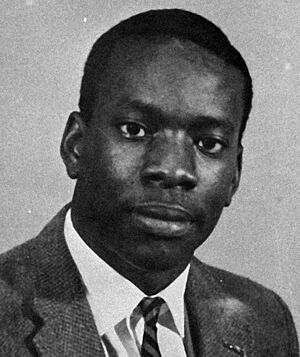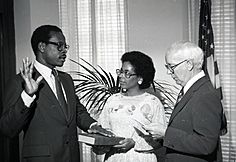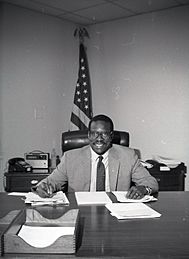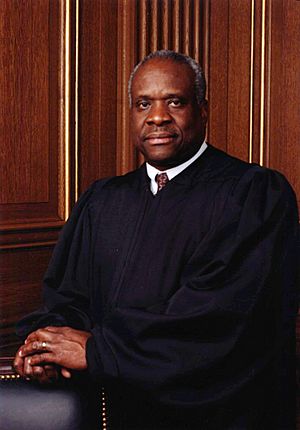Clarence Thomas facts for kids
Quick facts for kids
Clarence Thomas
|
|
|---|---|
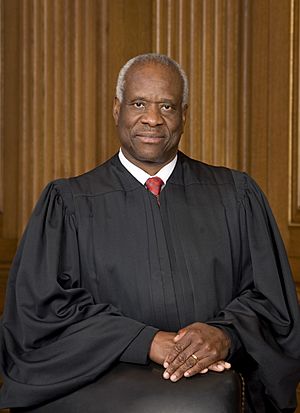
Official portrait, 2007
|
|
| Associate Justice of the Supreme Court of the United States | |
| Assumed office October 23, 1991 |
|
| Nominated by | George H. W. Bush |
| Preceded by | Thurgood Marshall |
| Judge of the United States Court of Appeals for the District of Columbia Circuit | |
| In office March 12, 1990 – October 23, 1991 |
|
| Nominated by | George H. W. Bush |
| Preceded by | Robert Bork |
| Succeeded by | Judith W. Rogers |
| Chair of the Equal Employment Opportunity Commission | |
| In office May 6, 1982 – March 8, 1990 |
|
| President | Ronald Reagan George H. W. Bush |
| Preceded by | Eleanor Holmes Norton |
| Succeeded by | Evan Kemp |
| Assistant Secretary of Education for the Office for Civil Rights | |
| In office June 26, 1981 – May 6, 1982 |
|
| President | Ronald Reagan |
| Preceded by | Cynthia Brown |
| Succeeded by | Harry Singleton |
| Personal details | |
| Born | June 23, 1948 Pin Point, Georgia, U.S. |
| Spouses |
Kathy Ambush
(m. 1971; div. 1984)Virginia Lamp
(m. 1987) |
| Children | 1 |
| Education | |
| Signature | |
Clarence Thomas (born June 23, 1948) is an American lawyer and judge. Since 1991, he has served as an associate justice of the Supreme Court of the United States. This is the highest court in the U.S. President George H. W. Bush chose him for this important role.
Clarence Thomas is the second African American to be a Supreme Court Justice. The first was Thurgood Marshall, whom Thomas replaced. Since 2018, Thomas has been the longest-serving member of the Court. He has also been the oldest member since 2022.
Thomas grew up in Pin Point, Georgia. His grandfather raised him in a poor Gullah community. He first wanted to become a priest in the Catholic Church. But he felt the church was not doing enough to fight racism. So, he changed his mind about joining the clergy.
He graduated with honors from the College of the Holy Cross in 1971. He then earned his law degree from Yale Law School in 1974. After law school, he worked as an assistant attorney general in Missouri. Later, he worked in private law. He became an assistant to U.S. Senator John Danforth in 1979. In 1981, he became Assistant Secretary for Civil Rights. This was at the U.S. Department of Education. The next year, President Ronald Reagan made him Chairman of the Equal Employment Opportunity Commission (EEOC).
In 1990, President George H. W. Bush nominated Thomas to be a judge. This was for the United States Court of Appeals for the District of Columbia Circuit. He served there for 19 months. Then, he was chosen to fill Justice Marshall's seat on the Supreme Court.
Justice Thomas is known for his way of interpreting the U.S. Constitution. He is an originalist. This means he looks at the original meaning of the words when the Constitution was written. He is often seen as the Court's most conservative member.
Contents
Clarence Thomas's Early Life
Clarence Thomas was born on June 23, 1948. He was born in a small wooden house in Pin Point, Georgia. Pin Point was a community founded by freed slaves in the 1880s. He was the second of three children. His parents were M.C. Thomas and Leola Williams. His family were descendants of enslaved people. They spoke Gullah as their first language.
When he was young, his parents divorced. His mother worked as a maid in Savannah. She could not raise her two young sons alone. So, Clarence and his brother went to live with their grandfather, Myers Anderson, in 1955.
Growing Up with Grandfather Myers Anderson
Living with his grandfather, Thomas had indoor plumbing and regular meals for the first time. His grandfather, Myers Anderson, had built a successful business. He delivered coal, oil, and ice. Anderson became a Catholic. He sent Thomas to Catholic schools.
Thomas went to St. Pius X High School. Then he transferred to St. John Vianney's Minor Seminary. He was the first black student at this boarding school. He studied hard and did well. He spent many hours at the Carnegie Library. This was the only library for black people in Savannah at the time.
His grandfather believed in hard work. He taught Thomas that "all of our rights as human beings came from God, not man." He also taught that racial segregation was wrong.
Clarence Thomas's Education Journey
From 1967 to 1968, Thomas attended Conception Seminary College in Missouri. He wanted to become a priest. But after Martin Luther King Jr.'s assassination, he felt the church wasn't doing enough against racism. So, he left the seminary.
College Years at Holy Cross
A nun suggested he go to the College of the Holy Cross. This was an elite Catholic college in Massachusetts. He received a full scholarship. He was one of the first black students there. He worked as a waiter and dishwasher to pay for his expenses.
Professors remembered Thomas as a very determined student. He studied alone and worked hard. He became a vocal student activist. He learned about the Black power movement. He helped create the Black Student Union (BSU). He even had a poster of Malcolm X in his room.
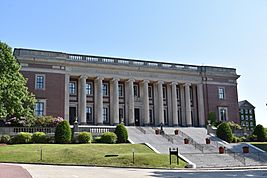
He joined a walkout when black students were treated unfairly. He also took part in anti-war marches. He later said these protests made him think differently about politics.
Thomas majored in English literature. He was a member of honor societies. He read works by black writers like Richard Wright and Malcolm X. He graduated in 1971 with a Bachelor of Arts degree. He was ranked ninth in his class.
Law School at Yale
Thomas was accepted into Yale Law School, Harvard Law School, and the University of Pennsylvania Law School. He chose Yale because it offered the best financial help. He was one of 12 black students there. He found it hard to connect with other students from wealthier backgrounds. But he did well in his classes.
He earned his law degree in 1974. After graduation, he wanted to work as a corporate lawyer. But he felt law firms didn't take his Yale degree seriously. He thought they assumed he got in because of affirmative action. He even put a 15-cent sticker on his law degree. This was to remind himself of what he felt was a mistake.
Clarence Thomas's Early Legal Career
Since he didn't get offers from big law firms, Thomas took a job. He became an associate with Missouri attorney general John Danforth. Thomas moved to Saint Louis. He passed the Missouri bar exam in 1974.
From 1974 to 1977, he was an assistant attorney general of Missouri. He was the only African-American on Danforth's staff. He worked in criminal appeals and tax divisions. He gained a reputation as a fair prosecutor. He later called this "the best job I've ever had."
When Danforth became a U.S. Senator, Thomas joined him in Washington, D.C.. He became a legislative assistant from 1979 to 1981. During this time, he switched from being a Democrat to a Republican.
Working for Civil Rights
Officials in President Ronald Reagan's administration noticed Thomas. They saw him as a Black conservative. He was offered a job as assistant secretary for civil rights. This was at the U.S. Department of Education. He took the job in 1981.
Soon after, he was promoted. He became chairman of the Equal Employment Opportunity Commission (EEOC) in 1982. He led the EEOC until 1990. His job was to enforce the Civil Rights Act of 1964. He worked to improve the agency's records. He also tried to make sure employers faced penalties for employment discrimination.
Clarence Thomas as a Judge
In 1989, President George H. W. Bush wanted to nominate Thomas for a federal judgeship. Thomas was 41. He wasn't sure if he was ready for a lifetime commitment as a judge. But he was encouraged to accept.
On October 30, 1989, President Bush nominated him. He became a judge for the United States Court of Appeals for the District of Columbia Circuit. This is a very important court. Many Supreme Court justices have served there.
The Senate Judiciary Committee recommended Thomas by a vote of 12 to 1. On March 6, 1990, the Senate confirmed him. The vote was 98 to 2. He served on this court for 19 months. During this time, he wrote 19 opinions. He also built good relationships with other judges.
Nomination to the Supreme Court
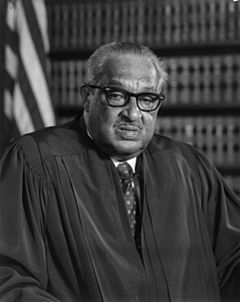
In 1991, Justice Thurgood Marshall retired from the Supreme Court. President Bush chose Clarence Thomas to replace him. Bush announced his choice on July 1. He called Thomas the "best qualified at this time."
Some groups opposed Thomas's nomination. They felt he was not experienced enough. But he had support from other African American officials. The American Bar Association (ABA) rated Thomas as "qualified" for the Supreme Court.
Formal confirmation hearings began on September 10, 1991. Thomas testified for 25 hours. This was one of the longest testimonies for a Supreme Court nominee. He was careful in his answers. He talked about his views on natural law. He said he saw it as a "philosophical background" to the Constitution.
The Senate Judiciary Committee voted 13–1 to send his nomination to the full Senate. But they did not recommend for or against him.
Senate Vote and Confirmation
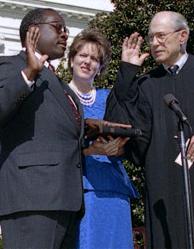
On October 15, 1991, the Senate voted to confirm Thomas. He became an associate justice. The vote was 52–48. This was a very close vote. It was the narrowest approval margin in over 100 years.
Thomas received his official document on October 23. He took his oaths of office. He became the 106th justice of the Supreme Court.
Clarence Thomas on the Supreme Court
After joining the Supreme Court, Thomas became a key member of its conservative side. He often agreed with Justice Antonin Scalia. They both believed in an originalist way of interpreting the Constitution. This means they look at what the Constitution meant when it was first written.
Thomas believes in the "original meaning" of the Constitution. He thinks judges should not make new laws. Instead, they should stick to what the Constitution says. He is known for being willing to overturn past decisions if he thinks they were wrong.
He has been called the most conservative member of the Supreme Court. His influence has grown over time. Especially as the Court has become more conservative.
Views on Government Powers
Thomas sees federalism as a key limit on the government's power. Federalism means power is shared between the national and state governments. He believes this protects individual freedom.
In cases about federal laws, he often looks at the original meaning of the Commerce Clause. This clause gives Congress power to regulate trade. He thinks this power should be limited.
Views on Individual Rights
Thomas generally supports free speech. He has voted to protect free speech in many cases. This includes issues like political ads and commercial speech. He has also ruled against laws that try to regulate hate speech.
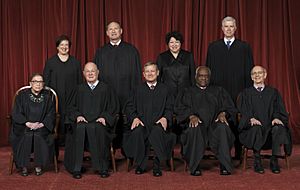
He believes that all limits on money given to political campaigns are unconstitutional. He thinks people should be able to give as much as they want. He also believes that students' speech rights in public schools should be limited.
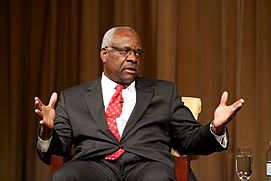
In cases about the Fourth Amendment, Thomas often supports police actions. This amendment protects people from unreasonable searches and seizures. He has supported drug testing for students. He also allowed random searches on people on parole.
Thomas believes the Equal Protection Clause of the Fourteenth Amendment means that race should not be considered. He thinks that programs like affirmative action, which aim to help groups that have faced discrimination, are wrong. He believes the government should treat everyone equally under the law, without considering race.
Oral Arguments
For many years, Thomas was known for not asking questions during oral arguments. These are the times when lawyers present their cases to the justices. He said he preferred to listen to the lawyers. He also said it was "unnecessary in deciding cases to ask that many questions."
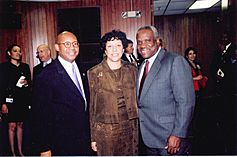
However, during the COVID-19 pandemic, the Court held arguments by phone. The justices took turns asking questions. Thomas started asking more questions then. Since the Court returned to in-person arguments, he often asks the first question.
Clarence Thomas's Personal Life
In 1971, Thomas married Kathy Grace Ambush. They had one son, Jamal Adeen, born in 1973. They divorced in 1984. In 1987, Thomas married Virginia Lamp. She is a lobbyist and works in conservative politics.
In 1997, they took in Thomas's six-year-old great-nephew, Mark Martin Jr. Since 1999, Thomas and his wife have traveled across the U.S. in a motorcoach.
Family and Public Life
Virginia "Ginni" Thomas is active in conservative politics. She has worked for conservative groups. She has also started her own lobbying firm. She has met with Republican politicians.
In 2022, text messages between Ginni Thomas and a White House official were made public. These texts showed her urging efforts to overturn the 2020 presidential election results. This led some politicians to ask Justice Thomas to step aside from cases related to the election. They felt his wife's actions might make him seem unfair.
Religion and Influences
Thomas reconnected with the Catholic Church in the mid-1990s. He is one of several Catholic justices on the Court.
He has been influenced by writers like economist Thomas Sowell. Sowell's book Race and Economics talks about individual action to overcome challenges. Thomas also admires Ayn Rand and her book The Fountainhead. He has said he has "some very strong libertarian leanings."
He also credits novelist Richard Wright as a big influence. Wright's books, like Native Son and Black Boy, captured feelings Thomas had.
Financial Disclosures
Supreme Court justices, like other federal officials, must report gifts they receive. This is to ensure fairness and openness.
Reports have shown that Justice Thomas received gifts from a wealthy real estate investor and Republican donor, Harlan Crow. These gifts included luxury trips, private jet flights, and stays at private resorts. Some of these gifts were not reported on his financial disclosure forms.
In 2023, it was reported that Crow also paid for private school tuition for Thomas's great-nephew. This was also not reported. Justice Thomas later said some omissions were due to a misunderstanding of the rules. He has since updated some of his reports.
These reports led to questions about ethics. Some people felt these gifts could create the appearance of a conflict of interest. Especially because the donor supports causes that might come before the Supreme Court. Investigations were opened by Senate committees.
Honors and Recognition
Clarence Thomas has received several awards.
- In 1992, he received the Horatio Alger Award.
- In 2001, he was given the Francis Boyer Award.
- In 2012, his alma mater, the College of the Holy Cross, gave him an honorary degree. He was also a member of the college's board of trustees.
- In 2020, Belmont Abbey College gave him the Benedict Leadership Award. This was for his dedication to his Catholic faith and public service.
See also
 In Spanish: Clarence Thomas para niños
In Spanish: Clarence Thomas para niños
- List of African-American jurists
- List of African-American federal judges
- List of justices of the Supreme Court of the United States
- Black conservatism in the United States
 | George Robert Carruthers |
 | Patricia Bath |
 | Jan Ernst Matzeliger |
 | Alexander Miles |


